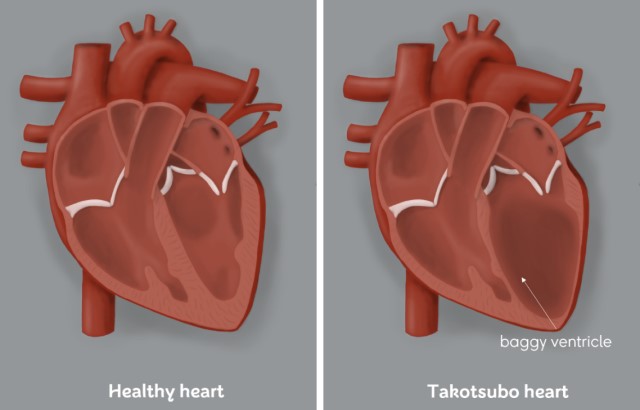

“I’m so stressed” is a phrase we hear all the time. What is stress? And what does it mean for our health?
In this series, we will examine some of the different types of stress our mind and body can experience. In part one and two, we learnt how psychological stress can cause inflammation and how mechanical stress effects how blood is pumped around our bodies. In the third and final part we will learn about emotional stress: how our feelings can cause physical effects on our hearts.

Part 3: Emotional stress - the truth behind a broken heart
We’ve all heard of a broken heart. It might sound like a romantic cliché but there is growing evidence that emotional distress can literally alter our heart’s shape.
Takotsubo (syndrome or cardiomyopathy) used to be frequently misdiagnosed as a heart attack and was also presumed that the misshapen heart would simply return to normal over time. With the help of our funding the understanding of its diagnosis, causes, and long-term effects are all improving.

Takotsubo is a condition that causes the left ventricle to change shape and fail to pump blood properly.
The link between depression and hearts
PhD student Liam Couch and team have used our funding to show that two molecules (called miR16 and miR26a) known to be associated with stress and depression could alter the behaviour of heart muscle cells during short-term stress. The team showed that in the presence of these molecules, the contracting power of heart muscle cells at the bottom of the heart would decrease in response to adrenaline , instead of increasing it, as normal.
Dr Dana Dawson of the University of Aberdeen has focussed on the long-term effects of Takotsubo. Her BHF-funded research has helped doctors advise people with Takotsubo about their ongoing symptoms , which may include heart failure. Dr Dawson also found that following Takotsubo, the energy metabolism in the heart is impaired, which might help explain the feelings of fatigue experienced in the following months.
Tackling Takotsubo without drugs
Understanding how emotions and mental health translate to physical symptoms has become an important field in biomedical research. Now, Dr Dawson is looking to the future of treating Takotsubo without medication, by using a rehabilitation program based on exercise or cognitive behavioural therapy. She hopes that one or both of these programs will allow people with Takotsubo to return to some level of normal life.
These advances show how stress and mental health can cause heart and circulatory diseases. Between them they have understood the link between depression and two circulating molecules, linked those molecules to Takotsubo, and seen how Takotsubo is linked to elevated inflammation in the body.
Whether the stress is physical, mental, or emotional, the BHF is searching for solutions, and will continue to fight against stress to beat heartbreak forever.
More BHF Research
Ever wondered which animal has the most complex heart? Or how what you drink can affect your health? How about if you can die from a broken heart?
Our brightest and best life saving research is brought to you each week.



